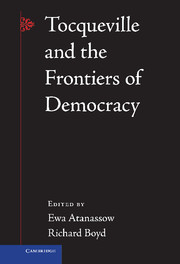Book contents
- Frontmatter
- Contents
- List of Contributors
- Short Title Abbreviations of Tocqueville's Major Works
- Acknowledgments
- Introduction: Tocqueville and the Frontiers of Democracy
- Part One The Meaning of Democracy and the Democratic Revolution
- Part Two Democratization in a Non-Western Context
- Part Three Challenges of Globalization: Democracy, Markets, and Nationhood
- 7 Tocqueville and the Unsettled Global Village
- 8 Nationhood – Democracy's Final Frontier?
- 9 Commerce, Glory, and Empire: Montesquieu's Legacy
- Part Four Democracy, Imperialism, and Foreign Policy
- Part Five Democracy's Old and New Frontiers
- Epilogue: New Frontiers, Old Dilemmas
- Bibliography of Works Cited
- Index
- References
9 - Commerce, Glory, and Empire: Montesquieu's Legacy
Published online by Cambridge University Press: 05 April 2013
- Frontmatter
- Contents
- List of Contributors
- Short Title Abbreviations of Tocqueville's Major Works
- Acknowledgments
- Introduction: Tocqueville and the Frontiers of Democracy
- Part One The Meaning of Democracy and the Democratic Revolution
- Part Two Democratization in a Non-Western Context
- Part Three Challenges of Globalization: Democracy, Markets, and Nationhood
- 7 Tocqueville and the Unsettled Global Village
- 8 Nationhood – Democracy's Final Frontier?
- 9 Commerce, Glory, and Empire: Montesquieu's Legacy
- Part Four Democracy, Imperialism, and Foreign Policy
- Part Five Democracy's Old and New Frontiers
- Epilogue: New Frontiers, Old Dilemmas
- Bibliography of Works Cited
- Index
- References
Summary
“This book is not precisely in anyone's camp.” Should we take at face value this statement at the end of the introduction to volume one of Democracy in America? Or should we see it, more subtly, as an echo of the quotation from Ovid with which Montesquieu prefaced The Spirit of the Laws: prolem sine matre creatum, a work created without a mother? For Tocqueville, as for Montesquieu, the point is by no means to forgo the inspiration of past sources but rather to announce a new method – the “new political science for a world altogether new,” which he evokes in keeping with the science of society for which The Spirit of the Laws laid the groundwork. From the first volume of Democracy in America – weaving together geographical causes, laws, and customs – to The Ancien Regime and the Revolution, which redeploys the method of Considerations on the Causes of the Greatness of the Romans and Their Decline, Tocqueville pursues Montesquieu's project: to determine the causes of institutions (laws, customs) and assess their effects in a comparative light, to theorize the adaptation of legislation to the “genius” of the people it is meant to govern, and to explain the deep causes of radical historical breaks, without denying any leeway to the human will.
Nevertheless, it is not sufficient to quote Tocqueville's famous phrase about his three “fetish authors”: Montesquieu, Rousseau, and Pascal. Beyond the parallels, we need to revisit an affinity that his contemporaries recognized but that has since been lost from view. Like the American Framers such as Madison and Hamilton, Tocqueville knew his debt to the “rarest political writer” of all time. In his eyes, however, Montesquieu was never a politician and would doubtless not have known how to be one. It is therefore necessary to separate theory and practice. As a political theorist, Tocqueville drew on analyses of England as a free, trade-oriented nation, and he suggested that the French should study the “American model,” to see liberty “as if in a mirror” and judge how free were their own institutions. As a politician, Tocqueville gradually distanced himself from the author of The Spirit of the Laws.
- Type
- Chapter
- Information
- Tocqueville and the Frontiers of Democracy , pp. 202 - 220Publisher: Cambridge University PressPrint publication year: 2013



